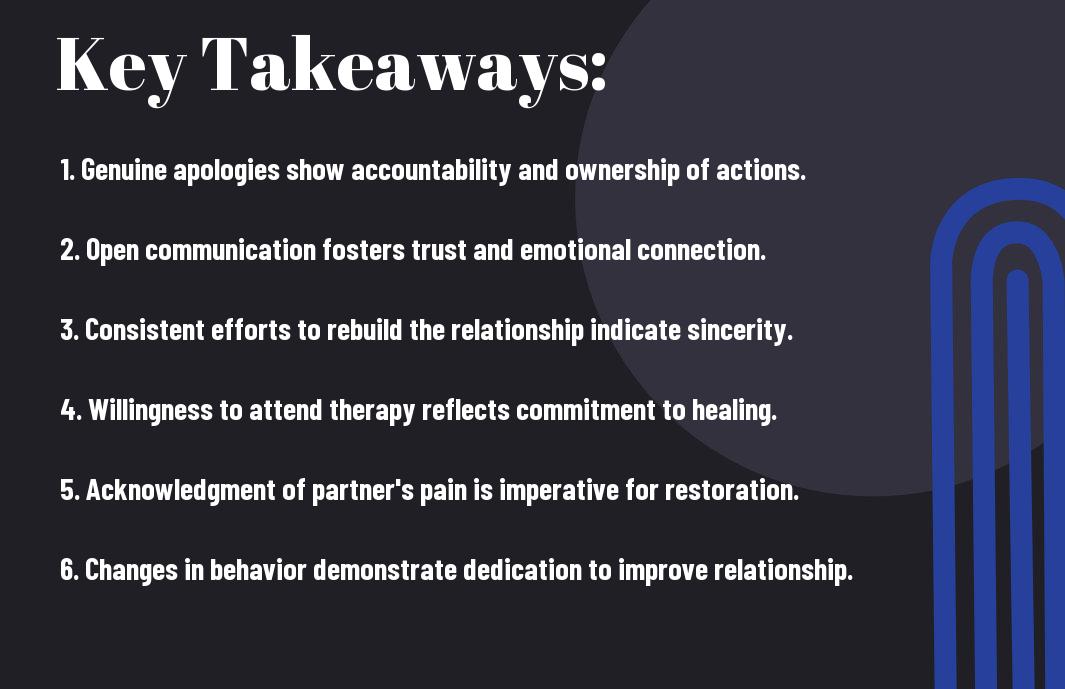Healing from an affair can feel overwhelming, but recognizing the signs of genuine remorse from your partner is a vital step toward rebuilding trust. As you navigate this challenging situation, it’s necessary to look for key indicators that demonstrate their commitment to change and understanding of the pain caused. This checklist will help you identify whether your partner is truly remorseful and willing to support your healing process, paving the way for a healthier relationship moving forward.
Key Takeaways:
- Genuine apologies are often specific, acknowledging the pain caused by the affair rather than offering generic statements.
- Consistent communication is vital; the remorseful partner frequently initiates conversations about feelings and healing.
- Actions speak louder than words; look for changes in behavior that reflect a desire to rebuild trust and commitment.
- Transparency about interactions with others, including setting boundaries, showcases accountability.
- Willingness to engage in therapy or counseling indicates a readiness to work through the issues together.
- Demonstrations of empathy, such as understanding and validating the feelings of the hurt partner, signal genuine remorse.
- A commitment to personal growth and addressing the underlying issues that led to the affair shows a dedication to healing the relationship.

Understanding Remorse
The journey towards healing after an affair requires a deep understanding of remorse, which can be a significant indicator of genuine regret and commitment to change. This emotional response showcases not only acknowledgment of the pain caused but also a sincere desire to make amends and rebuild trust. Recognizing remorse in your partner can pave the way for reconciliation and healing.
Definition of Remorse
To define remorse is to understand it as a profound sense of regret or anguish over one’s actions, particularly when those actions have inflicted pain on others. It involves recognizing the emotional impact of the betrayal and the desire to rectify the harm done. This definition lays the groundwork for assessing its presence in your relationship.
Differentiating Remorse from Guilt
Remorse focuses on the emotional pain caused to another, while guilt often centers on how one’s actions reflect on oneself. Unlike guilt, which may stem from selfish concerns, remorse showcases an understanding of the impact on others. Recognizing this difference is vital; from your perspective, remorse indicates a sincere attempt to understand your partner’s feelings and repair the relationship, while guilt can sometimes manifest as a defensive response, lacking a genuine desire to change.
Key Signs of Remorse
Some crucial signs of remorse after an affair can help you assess whether your partner is genuinely committed to healing the relationship. These signs include openness, accountability, and a sincere desire to make amends. Recognizing these behaviors can pave the way for rebuilding trust and moving forward together.
Openness and Transparency
Among the most telling signs of remorse is your partner’s willingness to be open about their feelings and actions. They should actively share details about their daily life and be available to discuss the affair without evasion. This transparency fosters an environment of trust and reassurance as you both navigate the healing process together.
Willingness to Listen
With a genuine desire to make things right, your partner must be willing to listen to your feelings and concerns. This willingness demonstrates they are taking responsibility for their actions and are committed to understanding your perspective.
Plus, an attentive partner will actively engage in conversations about your emotions, allowing you to express your thoughts without fear of judgment. It’s important that they acknowledge your pain and validate your feelings, showing genuine concern about the impact of their actions. This openness can help rebuild your trust over time and signals their commitment to change and growth. With their willingness to listen, you can work together towards healing and rebuilding your relationship.
Behavioral Changes Post-Affair
Keep an eye out for significant behavioral changes in your partner after an affair. Genuine remorse often manifests as shifts in attitudes and actions toward healing. If you’re questioning sincerity, consider exploring discussions about How can you tell real remorse vs fake? : r/survivinginfidelity. Such discussions can offer insight into your situation.
Increased Effort in the Relationship
Before an affair, you might have noticed a lack of investment from your partner. Now, if they’re putting forth extra effort—spending more quality time, initiating conversations, or surprising you with thoughtful gestures—this can be a sign of genuine remorse. Their determination to rebuild trust indicates they take your feelings seriously.
Accountability for Actions
To gauge sincerity, observe how your partner takes accountability for their actions. Genuine remorse involves openly acknowledging their mistakes without shifting blame or making excuses. They should show a willingness to discuss their behavior and how it impacted you and the relationship.
Understanding your partner’s capacity for accountability is vital for building trust. If they express remorse, it’s vital they actively participate in discussions about their actions. Look for an acknowledgment of their mistakes, a commitment to changing their behavior, and a willingness to listen to your feelings. If your partner avoids responsibility or tries to downplay the affair, it can be a red flag. Genuine accountability shows they are serious about your healing process.
Communication Patterns
Now that you understand the need for healing, assessing the communication patterns in your relationship is vital. After an affair, both partners should engage in open and constructive dialogue. Look for signs that show your partner is willing to listen actively, express their feelings honestly, and discuss the relationship’s challenges transparently. Effective communication can significantly aid the healing process, allowing both of you to rebuild trust and understanding.
Honest Conversations
By maintaining honest conversations, you and your partner create a safe environment to express thoughts and emotions. It’s important to address difficult topics without defensiveness. This openness can help you both gain insight into each other’s perspectives, fostering empathy and connection that are vital for the healing journey.
Expressing Regret and Apologies
Before moving forward, your partner should clearly express their regret and offer sincere apologies for the pain caused by the affair. This step is vital as it acknowledges the hurt you’ve experienced and takes responsibility for their actions.
But expressing regret goes beyond mere words; it requires a deep understanding of the impact of their actions on you and the relationship. Your partner must acknowledge specific behavior, demonstrate empathy for your pain, and offer real accountability. Avoid vague statements; instead, focus on heartfelt apologies that reflect an understanding of their wrongdoing. This sincere approach not only helps to mend the relationship but also fosters a stronger foundation for trust and intimacy moving forward.

Emotional Availability
After an affair, emotional availability is a significant indicator of remorse. If your partner is genuinely willing to engage in open conversations about their feelings and the impact of their actions, it showcases their commitment to healing the relationship. This openness is vital, as it allows for a deeper understanding of each other’s emotional needs and fosters trust moving forward.
Showing Vulnerability
After the affair, showing vulnerability is an vital sign of your partner’s remorse. When they openly express their emotions, fears, and insecurities, it indicates their willingness to become more transparent in the relationship. This vulnerability can be a powerful step towards rebuilding intimacy and trust.
Empathy Towards Partner’s Feelings
Along the path to healing, empathy towards your feelings is vital. Your partner must demonstrate an understanding of your pain and emotional turmoil, acknowledging the hurt caused by their actions. This realization often helps bridge the gap and encourages you to work together on the healing process.
Availability of empathy in your partner’s responses signifies their awareness of your experience. When they actively listen and validate your feelings, it creates a safe space for you to express your emotions. Empathy not only reflects a commitment to understanding your pain but also allows for a deeper emotional connection to form, fostering an environment of mutual support. This foundation is vital in restoring trust and rebuilding the relationship after the upheaval caused by the affair.

Commitment to Healing
Your journey towards healing requires a genuine commitment to make things right. This means actively working on rebuilding trust and understanding the underlying issues that contributed to the affair. By demonstrating a willingness to change, you show your partner that you are dedicated to a healthier future together. Additionally, open communication, setting goals, and being patient with the process are all important steps in fostering a sense of safety and emotional security for both partners.
Seeking Professional Help
Commitment to healing often includes enlisting the support of a professional therapist or counselor who specializes in relationship issues. They can provide a neutral space for both partners to explore their feelings, facilitate honest conversations, and guide you through the emotional complexities of your situation. Engaging with a professional can lead to profound insights, helping you to navigate the path toward reconciliation and lasting change.
Engaging in Relationship Activities
Help in healing can come from actively participating in shared activities that strengthen your bond. This may include date nights, engaging in hobbies, or simply spending quality time together. By creating new memories and experiences, you reinforce your connection and show your commitment to rebuilding the relationship.
Considering engaging in activities that foster connection is important for healing. Couples can benefit greatly from doing things they both enjoy, such as going on adventures, attending workshops, or prioritizing quality time at home. These shared experiences promote open communication and can help rebuild trust. Additionally, participating in therapeutic exercises as a couple can help both partners understand each other’s feelings and perspectives more deeply. Over time, these positive engagements can significantly improve your bond and pave the way for a more fulfilling relationship.
Conclusion
As a reminder, recognizing the signs of remorse after an affair is necessary for your healing journey. This checklist can help you identify genuine efforts toward rebuilding trust and emotional connection. Look for changes in behavior, consistent communication, and a willingness to confront the pain they’ve caused. Understanding these signs can guide you in determining whether to proceed with healing or reevaluate the relationship. Your emotional well-being is paramount, so trust your instincts as you navigate this challenging process.
FAQ
Q: What are common emotional signs that indicate a partner feels remorse after an affair?
A: Some emotional signs of remorse may include visibly demonstrated sadness or depression, increased empathy toward the hurt partner, and a strong desire to communicate openly about feelings. A remorseful partner may also express feelings of guilt and shame, and may actively seek forgiveness, showing they understand the impact of their actions.
Q: How can changes in behavior signal that a partner is genuinely remorseful?
A: A partner displaying remorse may actively take steps to rebuild trust, which may include being transparent about their actions, limiting contact with the affair partner, and showing commitment to the healing process. They might also prioritize quality time with their spouse, engage in couples therapy, and demonstrate a consistent effort to address the issues that led to the affair.
Q: Are there specific actions that a partner can take to demonstrate their remorse?
A: Yes, specific actions include taking accountability for their actions without making excuses, engaging in open and honest communication, and actively asking what they can do to support healing. They may also show willingness to participate in therapy couples and individual sessions and make changes to their lifestyle to ensure transparency and security for their partner.
Q: How can the partner who was betrayed gauge sincerity in their partner’s remorse?
A: The partner who was betrayed can look for consistency in the remorseful partner’s words and actions over time. Trust is rebuilt through ongoing accountability, a willingness to discuss feelings and issues openly, and meaningful behavioral changes. Consistency in making an effort to communicate and heal together can indicate genuine remorse.
Q: Is it normal for the healing process to take time after an affair, even with signs of remorse?
A: Yes, it is normal for the healing process to take significant time. Trust and emotional wounds take time to mend, even if the unfaithful partner shows clear remorse. Healing may involve addressing underlying relationship issues and rediscovering intimacy, which can be a gradual journey for both partners. Patience, ongoing communication, and support are crucial during this time.
